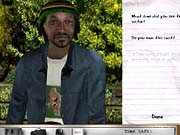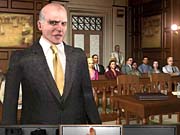Dead on the Money is a fitting subtitle for the first game based on the long-running Law & Order television series. In the game, a stockbroker has been found murdered, and you must investigate the crime and then successfully prosecute the suspect. It's a simple adventure game and a good translation of the premise and structure of the television show. But a better subtitle would have been "Trial and Error." Because of some frustrating mechanics, replaying the game is not just an option--it's a necessity.

Like the show, the game is broken into two distinct sections. In the first, you play as an NYPD homicide detective. A woman has been found strangled in Central Park, and you must gather evidence, interview possible suspects, and follow leads until you can issue an arrest warrant. Once the arrest warrant is issued, you move on to the second phase. At this point, you play as the prosecuting attorney and conduct further investigation and the trial itself.
The first half of the game is the most interesting. You send items to the crime lab, request search warrants, put people under surveillance, and try to build a case against one of the numerous suspects. The best thing about the investigation element is that it matches the tone of the show exactly. It's never overdramatic, and you simply follow the clues until you find someone who seems to have both the motive and the opportunity to commit the crime. The false leads you'll sometimes encounter seem less like intentional stumbling blocks and more like the realistic results of complex relationships.
The trial portion of the game is less refined than the first half but is still interesting in its own right. It's somewhat problematic that the trial often requires you to have a basic working knowledge of the legal system. It may remind some longtime adventure gamers of the nearly impossible Perry Mason: The Case of the Mandarin Murder, a game which also required you to actively participate in a trial and was so difficult that it's no wonder it was the last game of its kind until now. Most of the trial in Law & Order is fairly straightforward. You question people on the stand and object to the defense's questions when appropriate. But occasionally, you'll have to convince the judge to allow some important questions, and you may very well be stumped as to what legal argument to use.
There are legal references at your disposal, but you can't access them during the trial itself. This hints at the game's biggest flaw. Your first time through the game, and most likely your second and third, will feel like a rehearsal. Law & Order imposes numerous artificial restrictions, most likely to compensate for the fact that it's a very short game otherwise. The most notable restriction is the time limit, an extremely tight schedule that allows almost no room for error. Just searching the crime scene too thoroughly during the opening sequence can cripple you for the rest of the game. You don't have much time to issue an arrest warrant, and when the time is up, the game is over unless you have the right suspect behind bars.
There is a way to beat the time limit. At the beginning of each section, you get to choose two perks for your character. One of these is "efficiency," which makes your actions take less time. Another perk is "evidence" which gives you a special cursor that points out key things on the screen. The cursor isn't as special as it sounds, but without it, it's almost impossible to tell important items from scenery. One piece of crucial evidence is so well hidden that your special cursor isn't even much help. You can also choose to be a more skilled interviewer, which cuts down on some of the irrelevant questions available during questioning. This, too, is important, because the interviews are like text mazes, and a wrong question can leave you at a dead end without a crucial piece of information to continue. And once an interview is done, it's done.
Law & Order often seems as though it's going out of its way to make things more difficult for you, which is unnecessary because the game is rather difficult even without all the artificial restrictions. Understanding what evidence is needed to get a warrant, whom to subpoena as a witness, or how to separate the important info from the fluff is the fun part of the challenge. Doing so under tremendous time pressure and with a lousy cursor is the bad part. The game has only two traditional adventure-game puzzles. One requires you to figure out a safe combination, the other a computer password. Luckily there's no slider puzzle.

The rest of the challenge is by-the-book investigation, and the story itself is good. It would make for a pretty solid episode of the show, and the dialogue and acting are all convincing. It helps that three primary actors from the show, including the great Jerry Orbach as Detective Lennie Brisco, are along for the ride, but even the secondary characters do a good job. Their digital counterparts look fine, and the familiar music and title cards are there to make it seem even more authentic.
Because it's such a good translation of the show, Law & Order fans will likely persevere despite the game's frustrating structure. Fans of adventure games will also probably be glad to have a decent mystery to solve. You can play through the game twice with little time investment, and as long as you take copious notes of what works, you'll be able to solve the game eventually. But it's unfortunate that Legacy Interactive felt the need to make everything so much more difficult than necessary. As you endlessly comb the screen as the clock ticks away, you'll no doubt agree that a shorter, more forgiving Law & Order game would have been much better.